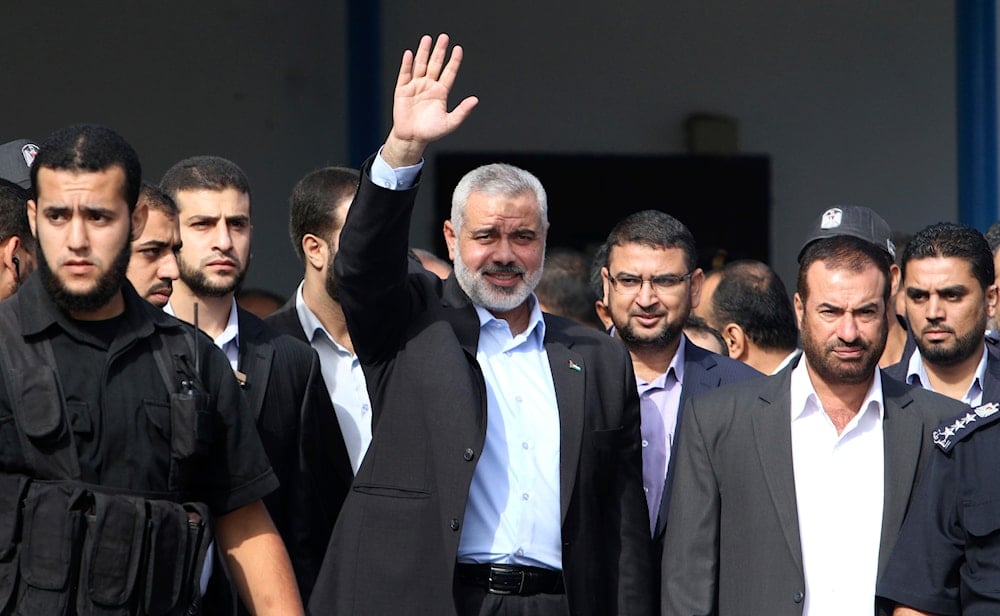Hamas denies Israeli reports about how Haniyeh was assassinated
Hamas denies several claims made by the Israeli occupation with regard to the assassination of former Hamas leader Ismail Haniyeh.
-

Former Head of Hamas' political bureau, Ismail Haniyeh, center, gestures at the Rafah border crossing between Egypt and Gaza, on October 18, 2011. (AP)
The Hamas movement has categorically denied the claims disseminated by the Israeli occupation, alleging details about the assassination of the former head of its political bureau, martyr and leader Ismail Haniyeh.
The Israeli occupation had claimed that the operation was executed using an explosive device planted in Haniyeh's room at an official Iranian guesthouse in Tehran during his official visit to attend the inauguration of Iranian President Masoud Pezeshkian.
In a press statement issued on Sunday, Hamas clarified that investigations conducted by a joint committee comprising its security apparatus and Iranian security agencies concluded that the assassination was carried out using a guided missile weighing 7.5 kilograms of explosives. The missile specifically targeted the martyr's mobile phone, according to the statement.
Hamas described the Israeli claims as a desperate attempt to divert attention from what it called a "compound crime," which included violating the sovereignty of the Islamic Republic of Iran by launching a missile targeting one of its official sites.
Israeli claims regarding the assassination of Haniyeh
Israeli media reported allegations regarding the assassination of Haniyeh, claiming that the operation was executed during his stay in Tehran. According to these reports, the Israeli occupation had initially considered other locations, such as Qatar, Turkey, and Moscow, for targeting Haniyeh, but allegedly decided on Iran due to his repeated stays at an IRGC guesthouse in the Sa'adat Abad neighborhood of northern Tehran.
The Israeli narrative suggested that Haniyeh's attendance at the inauguration of Iranian President Pezeshkian provided the opportune moment for the operation. It claimed that agents planted an improvised explosive device (IED) in his room shortly before the ceremony.
Positioned near his bed, the IED was reportedly designed to minimize collateral damage, being large enough to ensure Haniyeh's death but not to harm those in adjacent rooms.
Channel 12 alleged that the device was detonated at around 1:30 a.m., causing an explosion that blew a hole through the wall of Haniyeh's room and rocked the IRGC compound.
Israeli Security Minister Israel Katz, speaking at an event on Monday, confirmed for the first time that "Israel" was responsible for Haniyeh's assassination in Tehran earlier this summer.
Iran condemns Israeli confessions
Iran's permanent representative and ambassador to the United Nations, Amir Saeid Iravani, sent a letter to the UN secretary-general and Security Council, condemning "Israel's" clear acknowledgment of its responsibility for the assassination of Hamas leader Ismail Haniyeh in Tehran.
The letter emphasized the legitimacy of Iran's defensive response and reaffirmed Tehran's stance, asserting that the Israeli entity represents the greatest threat to regional and global peace and security.
"This audacious and shameless confession to the assassination of a political leader within the sovereign territory of a United Nations Member State once again underscores the international responsibility of the Israeli regime for its acts of terrorism and aggression," Iravani stated during the UN session.
"The continued silence of the Security Council, entrusted with the primary responsibility for the maintenance of international peace and security, would not only embolden this terrorist regime for the commission of more atrocious crimes but also undermine the core principles upon which the United Nations was founded," he further stressed.

 3 Min Read
3 Min Read








